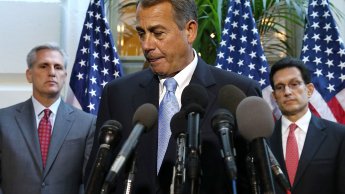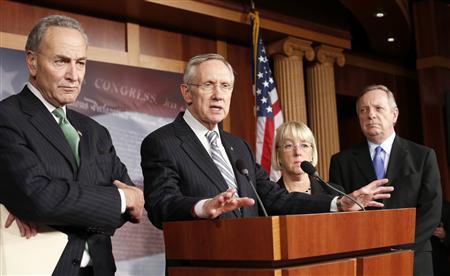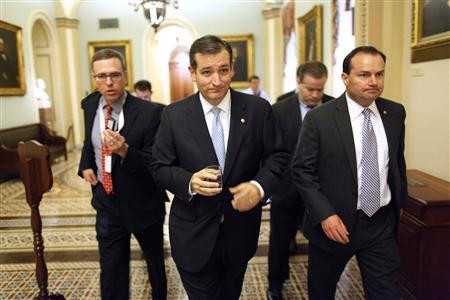www.aljazeerah.info
News, October 2013
Archives
Mission & Name
Conflict Terminology
Editorials
Gaza Holocaust
Gulf War
Isdood
Islam
News
News Photos
Opinion Editorials
US Foreign Policy (Dr. El-Najjar's Articles)
www.aljazeerah.info
|
Editorial Note: The following news reports are summaries from original sources. They may also include corrections of Arabic names and political terminology. Comments are in parentheses. |
US Congress Ends Default Threat, Obama Signs Debt Bill
October 17, 2013
 |
 |
| US House leader, Boehner, October 16, 2013 | US Senate leader, Reed, October 16, 2013 |
 |
|
| US Republican Senator Ted Cruz of Texas, who gave a 21-hour speech against extending health care to the poor (Obamacare), representing the soul of the Tea-Party faction inside the Republican Party, October 16, 2013. |
US Congress Ends Default Threat, Obama Signs Debt Bill
By Richard Cowan and David Lawder
Thursday, October 17, 2013, 3:20am EDT
WASHINGTON (Reuters) -
The U.S. Congress on Wednesday approved an 11th-hour deal to end a partial government shutdown and pull the world's biggest economy back from the brink of a historic debt default that could have threatened financial calamity.
Capping weeks of political brinkmanship that had unnerved global markets, President Barack Obama quickly signed the spending measure, which passed the Senate and House of Representatives after Republicans dropped efforts to use the legislation to force changes in his signature healthcare law.
The White House budget office told hundreds of thousands of federal workers, the bulk of whom had been idle for the past 16 days, to be ready to return to work on Thursday.
The down-to-the-wire deal, however, offers only a temporary fix and does not resolve the fundamental issues of spending and deficits that divide Republicans and Democrats. It funds the government until January 15 and raises the debt ceiling until February 7, so Americans face the possibility of another bitter budget fight and another government shutdown early next year.
With the deadlock broken just a day before the U.S. Treasury said it would exhaust its ability to borrow new funds, U.S. stocks surged on Wednesday, nearing an all-time high. Share markets in Asia also cheered the deal.
Taking the podium in the White House briefing room on Wednesday night, Obama said that with final congressional passage, "We can begin to lift this cloud of uncertainty and unease from our businesses and from the American people."
"Hopefully next time it won't be in the 11th hour. We've got to get out of the habit of governing by crisis," Obama said. He outmaneuvered Republicans by holding firm in defense of "Obamacare" to win agreement, with few strings attached, to end the 16-day shutdown.
World Bank President Jim Yong Kim said "the global economy dodged a potential catastrophe" with congressional approval of the deal to raise the $16.7 trillion U.S. debt ceiling.
The standoff between Republicans and the White House over funding the government forced the temporary lay-off of hundreds of thousands of federal workers from October 1 and created concern that crisis-driven politics was the "new normal" in Washington.
While essential functions like defense and air traffic control continued during the crisis, national parks and agencies like the Environmental Protection Agency have been largely closed.
Senator John McCain, whose fellow Republicans triggered the crisis with demands that the Democratic president's "Obamacare" healthcare reform law be defunded, said earlier on Wednesday the deal marked the "end of an agonizing odyssey" for Americans.
"It is one of the most shameful chapters I have seen in the years I've spent in the Senate," said McCain, who had warned Republicans not to link their demands for Obamacare changes to the debt limit or government spending bill. Polls showed Republicans took a hit in public opinion over the standoff.
In the end, the Democratic-led Senate overwhelmingly passed the measure on a 81-18 vote, and the Republican-controlled House followed suit 285 to 144. Obama signed the 35-page bill just after midnight.
POLITICAL DYSFUNCTION
Although the deal would only extend U.S. borrowing authority until the first week of February, the Treasury Department would have tools to temporarily extend its borrowing capacity beyond that date if Congress failed to act early next year. But such techniques eventually run out.
In addition to lifting the federal debt limit, the deal calls for creating a House-Senate bipartisan commission to try to come up with long-term deficit-reduction ideas that would have to be approved by the full Congress. Their work would have to be completed by December 13, but some lawmakers say the panel faces an extremely difficult task.
The agreement also includes some income verification procedures for those seeking subsidies under the 2010 healthcare law. But it was only a modest concession to Republicans, who surrendered on their latest attempt to delay or gut the healthcare package or include major changes, including the elimination of a medical device tax.
The congressional vote signaled a temporary ceasefire between Republicans and the White House in the latest struggle over spending and deficits that has at times paralyzed both decision-making and basic functions of government.
The political dysfunction has worried U.S. allies and creditors such as China, the biggest foreign holder of U.S. debt, and raised questions about the impact on America's prestige. The Treasury has said it risks hurting the country's reputation as a safe haven and stable financial center.
Senate Majority Leader Harry Reid and Republican leader Mitch McConnell announced the fiscal agreement on the Senate floor earlier on Wednesday, and its passage was eased when the main Republican critic of the deal, Senator Ted Cruz of Texas, said he would not use procedural moves to delay a vote.
The agreement stacked up as a political achievement for Obama, who refused to negotiate on changes to the healthcare law, and a defeat for Republicans, who were driven by Tea Party conservatives in their ranks and suffered a backlash in public opinion polls.
There was no immediate sign that House Speaker John Boehner's leadership position was at risk despite having conceded defeat in the budget battle.
Several Republican lawmakers suggested he may have strengthened his standing among the rank-and-file, who gave him a standing ovation at an afternoon meeting.
But Cruz, a Tea Party-backed senator with 2016 presidential aspirations, denounced the fiscal accord as a "terrible deal" and accused fellow Republicans of giving in too easily in their bid to derail Obamacare.
Obama's Democrats avoided claims of victory. "The bottom line is, millions suffered, millions didn't get pay checks, the economy was dragged down," said Senator Charles Schumer. "This is not a happy day, it is a somber day."
The fight over Obamacare rapidly grew into a brawl over the debt ceiling, threatening a default that global financial organizations warned could throw the United States back into recession and cause a global economic disaster.
Fitch Ratings had warned on Tuesday that it could cut the U.S. sovereign credit rating from AAA, citing the political brinkmanship over raising the debt ceiling.
A resolution to the crisis cannot come soon enough for many companies. American consumers have put away their wallets, at least temporarily, instead of spending on big-ticket items like cars and recreational vehicles.
"We're sort of 'crises-ed' out," said Tammy Darvish, vice president of DARCARS Automotive Group, a family-run company that owns 21 auto dealerships in the greater Washington area.
(Additional reporting by Thomas Ferraro, Steve Holland, Roberta Rampton and Mark Felsenthal, Amanda Becker, Patricia Zengerle, Susan Heavey, David Lawder and Jason Lange; Writing by Matt Spetalnick; Editing by Grant McCool and Tim Dobbyn)
Republicans ‘biggest losers’ in shutdown aftermath
France 24, October 17, 2013
By Jon FROSCH (text)
In the aftermath of a crisis that saw a shutdown of the US government (the first since 1995), analysts have been pondering the longer-term implications of America’s latest fiscal and legislative fiasco – particularly for the Republican party, which is facing most of the public’s blame for the gridlock.
FRANCE 24 touched base with two top political scientists for their insight: Thomas Mann of left-leaning think tank the Brookings Institution, and Karlyn Bowman of the right-leaning American Enterprise Institute.
Here are their answers to our questions.
F24: Polls show approval for Republicans dropping to new lows, and people blaming them for the shutdown far more than Obama. Will this shutdown have an impact on the midterm (Congressional) elections in 2014 and the presidential election in 2016?
TM: It depends very much on...what Republicans do to heal their wounds after the dust settles. [Because of the shutdown], Democrats have a better shot at holding their majority in the Senate in 2014, [but] Republicans have a big structural advantage in the House and a loss of their majority remains a long shot. And the 2016 Republican presidential nomination battle could produce an unelectable nominee.
KB: I’m not sure whether we will know for some time how much damage has been done by the antics of the last couple of weeks. Certainly Republicans look like the biggest losers now. But I’ve been struck in recent weeks about how incredibly fast the news cycle moves. Obama was in real trouble over Syria a few weeks ago, but that really seems like so long ago now. Will people remember all this next November? It is a long time from now, and we could have another fight in a few months.
F24: How can Republicans reduce the damage to their brand that we have seen reflected in polls over the last few weeks?
TM: Only with great difficulty and no guarantee of success. They have become a radical party, one prepared to take the country and the globe down if facing off with Obama. That’s a bad rap to overcome.
US POLITICS De Blasio: Right candidate at the right time for NYC?
KB: The bigger question is damage to views of [federal] government, which are lower than they have ever been. Republican and Democratic [state] governors are doing pretty well [in polls], as people see them as far away from the troubles of DC. People have much more confidence in their state governments.
F24: Republicans came out of the 2012 presidential election with a consensus that they had to appeal more to groups like women, black and Hispanic voters, young people, gays -- the “bigger tent” approach. What happened to that plan?
TM: That assessment was never accepted by Tea Party politicians and activists, nor by many other conservative Republicans in the House.
KB: It’s still the plan.
F24: How does Obama look after this? Reinforced? Weakened?
TM: He needs to destroy those weapons of mass destruction [chemical weapons in Syria] and refocus the agenda on economic growth and away from deficits and debt.
KB: He isn’t strengthened by this; nor will he be weakened much. No one looks very good right now. Second terms are notoriously difficult, and Obama is suffering from the “second term curse”. So, he hasn’t gained ground, but he hasn’t lost as much as the Republicans. The Democrats in Congress, while looking better than the Republicans, don’t look very good either.
F24: Does the latest crisis open the door for the emergence of a third or "independent" party?
TM: Not really. Our system makes it very difficult for a third party to win elections and have any basis for governing.
KB: Given our structure of government, it is hard for a third party to get traction. Getting on the ballot in each state is hard and you need a lot of money to do it.
F24: In France, the system of “midterm” legislative elections was abolished to avoid the kind of gridlock the White House and Congress are in right now. Legislative elections now take place right after the presidential, and so far the same party has won both. Would this kind of reform be embraced in the US?
TM: It should be embraced in the US, but that would require a constitutional amendment, which is very unlikely.
KB: I’m not sure I know enough about the French system, but I think our election calendar and structure will stay in tact for awhile.
Fair Use Notice
This site contains copyrighted material the
use of which has not always been specifically authorized by the copyright
owner. We are making such material available in our efforts to advance
understanding of environmental, political, human rights, economic,
democracy, scientific, and social justice issues, etc. We believe this
constitutes a 'fair use' of any such copyrighted material as provided for
in section 107 of the US Copyright Law. In accordance with Title 17 U.S.C.
Section 107, the material on this site is
distributed without profit to those
who have expressed a prior interest in receiving the included information
for research and educational purposes. For more information go to: http://www.law.cornell.edu/uscode/17/107.shtml.
If you wish to use copyrighted material from this site for purposes of
your own that go beyond 'fair use', you must obtain permission from the
copyright owner.
|
|
|
|
||
|
||||||


